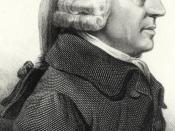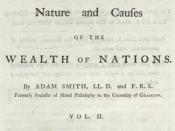Adam Smith and the invisible hand describe the five basic principals of economics. He believed that everyone attempts to become rich only looking for his gain. This article about Adam smith was created by Helen Joyce. She has a neutral feel to her article. She doesn't disagree or agree, but explains in depth what Adam Smith is trying to convey.
Adam Smith was a Scottish economist and moral philosopher. He was born on June 5, 1723 and died on July 17, 1790. He was born in Kirkcaldy, Scotland. He is often regarded as the father of economics.
Adam Smiths work "Inquiry into the Nature and Causes of the Wealth of Nations," was and is one of his famous writings. This piece of work attempted the study of industry and commerce in Europe. This writing helped derive the modern discipline of economics. It also came up with the different types of economies.
She also goes ahead and says the five points of the invisible hand. The first one is that there is a benevolent deity who administers the world in a way to maximize human happiness. The second one is that in order for the deity to do this, he has created humans to act a certain way. The third one is that the world is pretty much perfect, and that everyone is almost equally happy. The forth on is that we think that if we were wealthier, we would be happier.
The final point is that this feeling leads to a struggle to become wealthier, therefore increasing the total amount of human happiness. He also thought that the worst crime to commit was theft. If you think about it, it is true because which ever heinous crime you're talking about, it involves taking something away from the...


